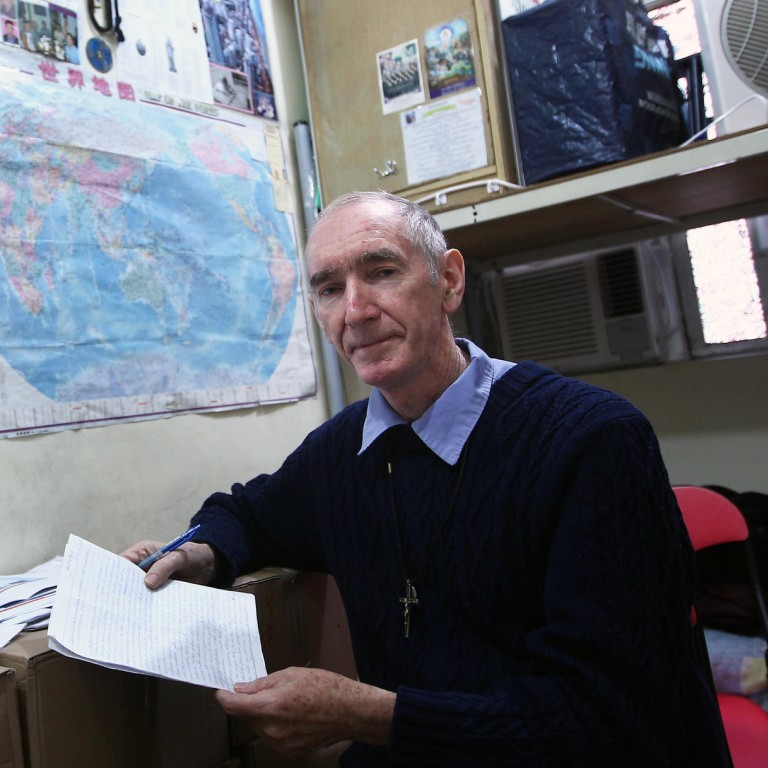
Prison chaplain says lack of job prospects in Hong Kong force many refugees into life of crime
Prison chaplain says it's time Hong Kong closes the door as lack of opportunities means many refugees turn to a life of crime to survive
Hong Kong should shut the door on asylum seekers or risk this vulnerable group sinking deeper into the mire of criminal justice, says a prison chaplain who has visited hundreds of would-be refugees behind bars.
Father John Wotherspoon, who visits inmates and detainees, said he has noticed a worrying trend of more asylum seekers serving time for serious drug or violence-related crimes, compared with previous years when their jail terms were imposed for illegal employment.
"There are more and more asylum seekers in prisons and the number has increased in the last couple of years," Wotherspoon said, adding that "their offences are also increasing in gravity".
"In the past, they were in prison for working illegally, but now more and more, they are in for stealing because they haven't got much income for accommodation, travel or food. So they tend to steal or work illegally."

Wotherspoon referred to a recent knife attack on the platform of Jordan MTR station that involved asylum seekers from India as an example of desperation.
"My thinking is to shut the door because most of them are economic migrants," he said.
"Their countries are very poor and they are searching for a better future for their families. Some of them have been here several times, coming back on different passports. I ask them why they keep coming and they say that, even in prison here, it is better than home."
Wotherspoon suggested Hong Kong could follow the example of Singapore, which has a closed-door policy on asylum seekers because of limited land.
Asylum seekers who reach Hong Kong's shores lodge a non-refoulement claim declaring their fear of persecution or harm in their home countries. While their claims are being assessed, they are not allowed to work.
Government figures in recent years show the number of asylum seekers locally has doubled. As of August, there were 10,260 protection claims, compared with 4,892 three years ago.
During this period, the number of arrested asylum seekers rose from 683 in 2012 to 904 last year. The number of arrests for illegal work fell, but detentions for other crimes like theft, assault or drug-related charges increased.
A government spokeswoman, giving a combined response from the Security Bureau, Immigration Department, Social Welfare Department and police, disputed Wotherspoon's observations.
She said claimants received assistance such as HK$1,500 per month for rent, rental deposits of up to HK$3,000 and property agent fees of up to HK$750. They were also given HK$1,200 in food coupons, HK$300 for utilities, and HK$200 to HK$420 in travel allowances a month, she added.
"We reject the assertion that claimants are turning to crime 'as a means to survive', especially where many of the crimes committed are serious crimes including rape, physical assault, drug trafficking [and] burglary," the spokeswoman said.
Wotherspoon's call for a judicial inquiry into the city's open-door policy for asylum seekers comes at a sensitive time, as a refugee crisis in Europe has led many countries there to accept more refugees than before.
He proposed three possible solutions. One is to give some a small amount of cash to return home so they could repay debts that they might have racked up by travelling to Hong Kong.
"It might be a few thousand dollars, and that could be the biggest group," he said.
Another solution would be to help genuine refugees resettle elsewhere. The third option would entail helping those who have lived here a long time and can speak excellent Cantonese to join the workforce.
"But you can't do that unless the door is shut for others."
Francesco Vecchio, director of refugee advocacy group Vision First, said a closed-door policy would not necessarily solve the problem. Rather, Hong Kong should open the door to "unskilled" labour, he said.
"It is a fact that most asylum seekers work," Vecchio said.
"They do not steal jobs from locals, but complement the local labour market by creating opportunities for local low-scale businesses to earn an income."
He said the greater numbers turning to serious crimes was due to factors including the strong US dollar, which had put pressure on trading activities that asylum seekers were usually engaged in.
"They may thus be recruited as thugs and drug pushers to a larger extent than before," Vecchio said.
